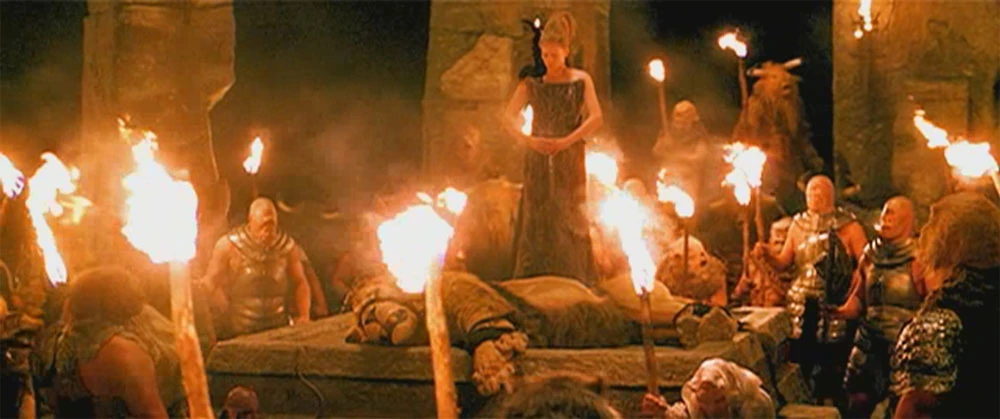This is a question that theologians have debated for centuries. They usually try to explain it by way of analogy, but often they'll add the caveat that those explanations are insufficient.
For example there's the courtroom analogy, as is seen in the Lion the Witch and the Wardrobe. Edmund is a traitor, and the ancient laws say that traitors must die. The White Witch has a claim on Edmund, but Aslan offers himself in Edmunds' place. So the Witch sacrifices Aslan, even on an altar, but because Aslan is blameless, the act breaks the ancient magic, Aslan comes back to life, and defeats the Witch. So it is with Jesus.

God declared that the punishment for sin was death- not just physical death, but spiritual death away from God. Jesus took the punishment we deserved on himself so that God does not have to be contradicted and the ancient law could be appeased. In so doing he broke the ancient way, so that now we are freed from the logic of sin and death.
This analogy is helpful, and true as far as it goes, but is insufficient. Because why should God be bound to a law that He created- was there some legally binding agreement with the devil? It's a very good analogy, but leaves more questions.
Another helpful way to understand this is to understand the Jewish logic of sacrifice. In the Old Testament (which means old covenant or old deal) Jews would have to sacrifice an animal on an altar to please God and appease His justice. You could sacrifice an animal in place of someone else- Think Abraham and Isaac or Moses sacrificing the lambs at passover.
It takes a lot longer to explain this piece to people when they ask since you have to explain the whole Old Testament logic of sacrifice, but this helps us understand Jesus' sacrifice a lot better! After all, Jesus came to 'fulfill the law and the prophets' (Matt 5:17)- so everything that happened in the Old Testament happens again in a new significant way in the New Testament. Jesus death on the Cross fulfills Abraham and Isaac (A father sacrifices a son on mount Moriah) and even more obviously it fulfills Passover, as they celebrate the Last Supper on the feast of Passover. This is why John the Baptist calls Jesus the "Lamb of God who takes away the sins of the world" (John 1:29). Just as at the Passover the Hebrews had to sacrifice a lamb and eat it in order for the angel of death to Passover them, so Jesus had to be sacrificed and we can participate in that Sacrifice by receiving the Eucharist, the unleavened bread which at Passover Jesus broke and said "This is my body, do this in remembrance of me." (Luke 22:19)
All of this is obviously key to understanding why Jesus' death is redemptive, but it still begs the question- why did God have to do it that way?
I think the trick is that that question is wrong. I don't think he had to do it that way. I think he chose to.
I think we make a mistake when we frame our relationship with God and his redemptive sacrifice in legal language, as though God is bound by some law that is over even Him.
I think if we really want to understand it, we have to understand it through the language of love and relationship. So when you think of it in these terms, why would a God who is totally motivated by Love choose to redeem the world through his own sacrifice?
From this perspective it's actually easy to speculate about the answers. Love has it's own logic- why have children? Why get married? Why give to the poor? We are not legally bound to do these things, but we make huge sacrifices in order to do them out of love.
I think this is why the language in scripture is so much more often about a wedding than about a courtroom. Just as a groom gives himself to his wife out of love, so Jesus gave himself to us. His gift of self become totally complete when he died, which is why he says "It is finished" or even "It is consummated." (John 19:30) We receive his gift of self when we receive the Eucharist- and in so doing we give ourselves back to him.
God the lover shows his love for us by dying for us- "greater love has no man..." (John 15:13), and "God proves his love for us in that while we still were sinners Christ died for us." (Romans 5:8).
Perhaps God, the author of history, was not trying to fulfill some legal obligation. Perhaps he wrote salvation history in such a way that the lover gives himself for his bride and dies and comes back. Not because he had to do it- he chose to do it to show us what his love for us is like.

No comments:
Post a Comment